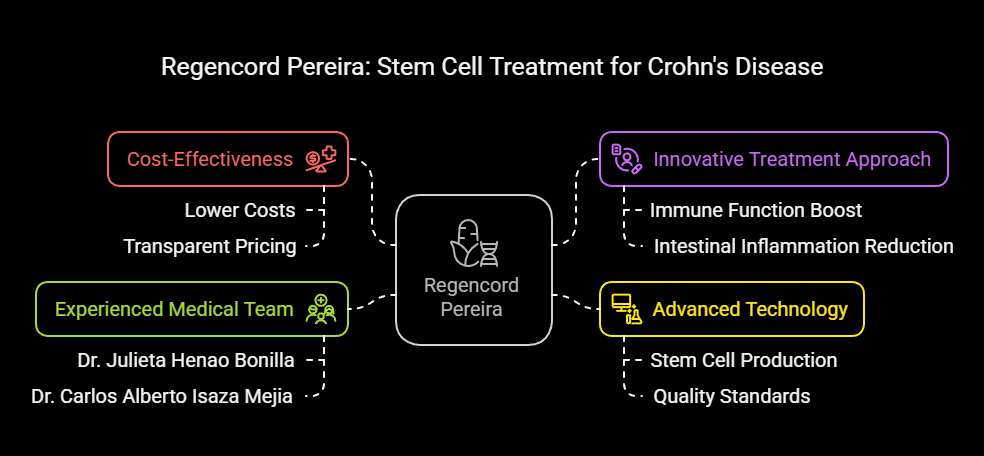

Colombian stem cell treatment for Crohn’s disease costs substantially less than treatments in the U.S. and Europe. Patients pay between $8,000 to $15,000, which is 70% cheaper than other countries. Colombia’s medical regulations and internationally trained specialists have made the country a global leader in stem cell therapy.
Regencord's facility in Pereira has developed an innovative stem cell treatment that targets Crohn's disease. This new treatment for Crohn's disease works to boost immune function and decrease intestinal inflammation. Their team looks at why Crohn's disease occurs and creates personalized treatment plans. Many patients have seen substantial improvements in their symptoms. Regencord's complete treatment approach, advanced technology, and experienced medical professionals make it a trusted choice for patients who need better options than conventional Crohn's treatments.


Crohn’s disease is one of the most challenging forms of inflammatory bowel disease (IBD). It causes ongoing inflammation throughout the gastrointestinal tract. Unlike other digestive conditions, Crohn’s can affect any part of your digestive system from mouth to anus. Symptoms come and go between flare-ups and periods of remission. Many patients face a relentless cycle of pain, uncertainty, and a lower quality of life.
Crohn’s disease is an autoimmune condition where your body’s immune system attacks its own intestinal tissues. This immune system malfunction creates ongoing inflammation that damages the digestive tract lining as time passes. The original lesions start as infiltrates around intestinal crypts and gradually spread into deeper tissue layers.
Patients often deal with these debilitating symptoms:
Crohn's disease leads to serious complications. About half of all patients develop intestinal issues like fistulae, strictures, and abscesses within 20 years of diagnosis. More patients develop nutritional deficiencies from chronic diarrhea, including losses of iron, calcium, magnesium, fat-soluble vitamins, and essential minerals.
Traditional treatment for Crohn's disease usually starts with medications to reduce inflammation and suppress immune response. These treatments don't work very well with many limitations.
Standard medications include corticosteroids, immunomodulators (like azathioprine and 6-mercaptopurine), and biologic agents that target specific inflammatory pathways such as TNF Alpha. Doctors often use corticosteroids first to fight flare-ups. These work for quick symptom relief but aren't good for long-term therapy because of severe side effects. Long-term steroid use can cause osteoporosis, osteonecrosis, adrenal insufficiency, Cushing features, acne, weight gain, high blood pressure, and diabetes.
Immunomodulatory agents and immunosuppressive medications need three to four months to show any improvement, making them useless for managing sudden symptoms. These medications also risk bone marrow suppression, liver problems, and slightly higher cancer risks. People with Crohn's who take immunosuppressants have double the lymphoma risk compared to those who don't (4 in 10,000 versus 2 in 10,000).
The biggest problem is the high treatment failure rate. All but one of these medications don't work at all for 25% of Crohn's patients. Another 50% stop responding to medicines that once worked. Even advanced biologics fail 30-50% of the time.
Patients explore alternative options when standard treatments fail, especially with "treatment-refractory" disease. This usually happens in several situations.
Patients face repeated treatment failures despite trying multiple medications. Research shows 40% of patients don't respond to biologic medications. Each failed treatment brings not just medical disappointment but continued suffering.
Side effects become unbearable. Many patients spend years trying medications, surgeries, and colostomies with little improvement. Surgery becomes the last conventional option. About 57% of Crohn's patients need at least one surgery, and 70% end up needing surgical intervention. This need for surgical removal of damaged intestine pushes patients to investigate regenerative options like stem cell treatment.
Promising regenerative approaches—particularly stem cell treatments—have emerged as potential options for those who've tried everything else. These treatments want to do what standard therapies can't: reset the immune system and help damaged tissues heal instead of just hiding symptoms.
How Stem Cell Treatment Works for Crohn's Disease
Stem cell treatment shows great promise for Crohn's patients who haven't had success with regular therapies. Crohn's disease research and stem cell clinical trials demonstrate that stem cells can fight Crohn's disease in multiple ways. They tackle both symptoms and why they happen simultaneously.
Mesenchymal stem cells (MSCs) are the foundations of many stem cell treatments for Crohn's disease. These amazing cells come from bone marrow, adipose (fat) tissue, and the umbilical cord. MSCs are a great way to get treatment because of their unique biological features. They can multiply themselves, turn into different cell types, and they have low immunogenicity. Their low immunogenicity means they have minimal levels of class I HLA antigens and don't show type II HLA antigens. This lets doctors transplant them from donors without rejection.
MSCs know how to find damaged areas in the body. They move right to inflammation spots in the intestinal tract, where they can help heal. This targeted approach works really well for the intestinal inflammation seen in Crohn's disease.
Stem cells' ability to fight inflammation is one of their most powerful weapons against Crohn's disease. Although MSCs weren't anti-inflammatory to start, they developed this ability when proinflammatory cytokines like TNF-α and interleukin-1β stimulated them.
Active MSCs release several powerful anti-inflammatory substances:
Scientists found something fascinating about how MSCs work. They first release PGE2 molecules that suppress inflammatory T-cells. The effects continue even after the stem cells die through efferocytosis. Macrophages eat the dying MSCs and become anti-inflammatory cells.
Stem cells do more than reduce inflammation—they reset the immune system, tackling a root cause of Crohn's disease. Clinical studies reveal impressive results. About 90% of carefully chosen Crohn's patients benefit from stem cell transplantation, compared to only 15% who respond to new drugs.
MSCs reduce T cell growth based on the dose given. They also change macrophages to fight inflammation instead of causing it, reducing their production of inflammatory cytokines like TNF-α, IL-6, IL-1α, and IL-1β. Stem cells also stop helper T cells Th1 and Th17 while helping regulatory T cells develop.
The most interesting part? When the disease comes back after stem cell treatment, it often looks different. Patients suddenly respond to medications that didn't work before, suggesting the immune response has fundamentally changed.
Stem cells help heal and regenerate tissue while modulating the immune system. They fix the intestinal mucosal barrier by releasing specific cytokines and vesicles. These secretions help new blood vessels form and prevent too much scarring.
Studies with human bone marrow-derived MSCs showed they help restore the intestinal lining. They create the right environment for intestinal stem cells to grow and become intestinal epithelial cells. MSCs also protect against oxidative stress damage by stopping harmful oxygen radicals.
Clinical trials back up these healing effects. Half of the patients who got stem cell injections for Crohn' s-related intestinal strictures saw complete or partial improvement by week 12. More than 70% of patients went into remission within three months of stem cell therapy, and over half stayed in remission for 1-2 years after treatment.

Regencord has grown into an innovative center for stem cell treatment in Pereira, Colombia over the last decade. The center began a mission to improve health outcomes for patients with chronic conditions. Their treatment approach to Crohn’s disease marks a major breakthrough in regenerative medicine that addresses both symptoms and why it happens.
Scientific principles and research form the foundation of Regencord’s impressive track record in regenerative medicine. The clinic has treated more than 5,000 patients worldwide and earned trust in stem cell therapy. Their global reach and reputation shine through the fact that over 70% of their patients travel from the United States. Their specialized approach to inflammatory conditions, including Crohn’s disease, has earned this international recognition.
Regencord managed to keep their focus on evidence-based treatments through the years. Their results tell the story—more than 90% of patients report positive outcomes with zero serious adverse events. This outstanding safety record has made them leaders in stem cell therapy for inflammatory bowel conditions.
Regencord's complete control over stem cell production sets them apart. The clinic produces stem cells in their own advanced laboratory rather than outsourcing cell processing. Their sterile labs house specialized equipment run by experts in genetics, pharmacology, biology, biotechnology, and bacteriology.
Quality control stands at Regencord's core. The facility meets multiple international standards:
Their membership in the International Society for Cell & Gene Therapy (ISCT) helps them integrate state-of-the-art research into treatments for Crohn's disease and other inflammatory conditions.
The clinic's success in treating Crohn's disease comes from its multidisciplinary medical team. Two distinguished professionals lead the way:
The leadership team works with specialists in radiology, orthopedics, anesthesiology, biology, and bacteriology. This range of expertise enables Regencord to develop detailed treatment protocols that target immune dysfunction and intestinal inflammation in Crohn's disease. Their integrated approach aims to enhance immune function, decrease intestinal inflammation, and stimulate tissue repair. This gives patients lasting relief from this challenging condition.


The cost plays a vital role for patients who want to try stem cell treatment for Crohn’s disease. Many patients look at treatment options worldwide, and Regencord in Pereira stands out as a cost-effective choice.
Regencord keeps its pricing simple and clear for stem cell treatments. The therapy for conditions like Crohn’s disease costs between $6,900 and $7,900. Patients know exactly what they’ll pay without any surprises. International patients can add hotel stays to their package for $690, which takes care of accommodation worries during treatment.
The money you save at Regencord really shows up in global price comparisons. US clinics charge anywhere from $15,825 to $26,900, and some even ask for up to $50,000. European treatment costs run between $5,000 and $35,000, based on location and treatment type. For comparison, stem cell treatment for ulcerative colitis in the USA, a related inflammatory bowel disease, can cost similarly high amounts.
The complete package at Regencord covers stem cell collection and processing, treatment by specialist doctors, initial consultations, diagnostic tests, follow-up care, and local transportation.
Most insurance companies don't currently cover stem cell therapy for Crohn's disease. Regencord understands this challenge and works with trusted partners to offer financing options. Their team helps patients explore these payment choices.
Medicare covers some FDA-approved stem cell therapies, but experimental treatments are usually excluded. Most patients end up using their savings, medical loans, or special healthcare financing programs.
Regencord Pereira offers a breakthrough stem cell treatment that works better than traditional options for Crohn’s disease patients. Their impressive track record shows that more than 70% of patients reach remission in just three months. The treatment costs 50-70% less than U.S. prices, making it available to patients worldwide.
Regencord leads the field in stem cell therapy with cutting-edge facilities and expert medical teams that follow detailed treatment protocols. The patient results tell a powerful story of reduced inflammation, less reliance on medication, and better quality of life that leads to long-term remission.
Of course, stem cell treatment does more than just manage symptoms – it brings real hope for healing. Regencord has become a trusted destination for Crohn’s disease patients who want to take charge of their health. Their proven success stories, strict safety standards, and clear pricing help patients begin their path to recovery with confidence. Take the first step towards a healthier future today—contact Regencord and schedule your consultation to learn more about how stem cell therapy can help you reclaim your life!
3-Step Process for Stem Cell Treatment for Arthritis in Hands
Stem cells are unique cells with the ability to develop into various cell types and repair damaged tissues. They are used in regenerative medicine, including treatments for cancer, neurodegenerative diseases, and injuries. Sources include bone marrow, cord blood, and embryos.
+1 888-540-4101


